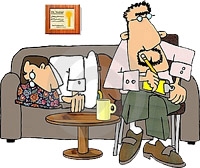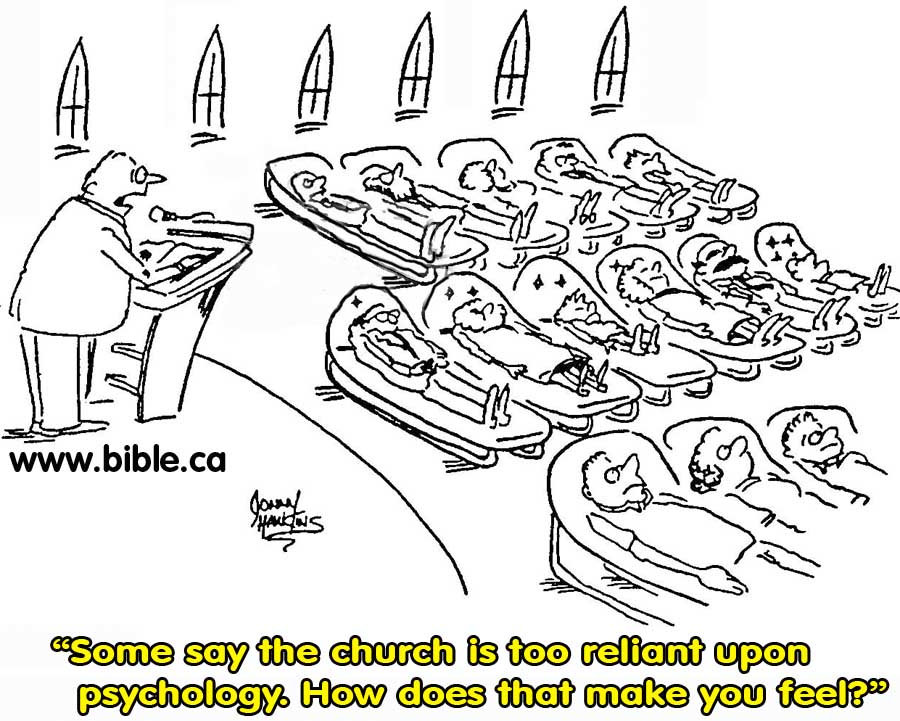The world's counseling systems
|
|
Ordinary Christians make better psychiatrists than psychiatrists, better psychologists than psychologists and better councilors than councilors! |
Introduction:
- We have pioneered "The free, three session, Biblical counseling system". If you need help, get started right now.
- Detailed study on the Biblical pattern of counseling
- "Is therapy effective? Is it any better than friendship? Do high-paid professionals do a better job than minimally trained counselors? Does training and experience improve a therapist's skill? Is therapy always safe? Do professionals know more about human nature than the rest of us? Would people naturally get worse without professional treatment? They say yes to all of these questions while scientific studies that address them are coming to a resounding NO! ... This "NO" is a warning - an invitation to look more closely at the claims that psychotherapy works." (Manufacturing Victims, Dr. Tana Dineen, 2001, p 114)
- "the psychiatrist's special training is said to equip him "no better . . . than any other human being of similar age and similar experience of working directly with disturbed people". Werry sees psychiatric training as largely irrelevant to the work he must pursue. (John S. Werry's "The Psychiatrist and Society," Dis-Coverer, Vol. 5, No. 3, August 1968, p. 8, quoted in Competent to counsel, Jay Edward Adams, p36)
- "Another important figure in the early history of the medicalization of malingering was Ernst von Feuchtersleben. A graduate of the University of Vienna's medical school, Feuchtersleben practiced and taught surgery, was active in educational reform, and was also a respected poet. He is the author of two books on "mental illness." The first, a major treatise, Lehrbuch der tirtzlichen Seelenkunde (Textbook of the Medical Cure of Souls), translated as The Principles of Medical Psychology, was published in 1835. The second, Zur Dieitetik der Seele, a slim volume, appeared in two different American editions: one titled The Dietetics of the Soul (1838), the other titled Hygiene of the Mind (1933). Feuchtersleben deserves to be better known than he is: he coined the term psychopathology and recognized that mental illnesses are not "like other illnesses" but that, unavoidably, they play an important role in the every-day practice of medicine and in the expanding field of "judicial psychology" (forensic psychiatry). In The Principles of Medical Psychology, he memorably stated: "The maladies of the spirit [die Leiden des Geistes] alone, in abstracto, that is, error and sin, can be called diseases of the mind only per analogiam. They come not within the jurisdiction of the physician, but that of the teacher or clergyman, who again are called physicians of the mind [Seelendrzte] only per analogiam. The maladies of the body alone in abstracto, for instance, of the brain or nerves, without mental alienation, are not diseases of the mind, but of the body." (see: Feuchtersleben, Principles of Medical Psychology, 1847 AD, 74-75) (Psychiatry: The Science of Lies, Thomas Szasz, 2008 AD, p20)
|
A. Counseling styles contrasted: To illustrate the differences between the various counseling methods, picture a poor fellow sitting on a tack suffering from severe pain. He has come in for help with the pain. |
- First he sees a counselor who holds the chemical view-point: Hearing the client's complaints, he immediately pre-scribes tranquilizers or pain killers. The solution is to anesthetize him. Surgery may be suggested to sever the nerves where the pain is coming from. This will knock out the symptoms and give the client relief.
- Next he sees a Freudian psycho-analyst who looks over the situation and says: The pains you feel are located near your sexual area. You have some repressed memories and I think we'd better go back into your childhood experiences and learn about some of your early sexual experiences at age 1 year old. Then, perhaps we'll be able to alleviate your pain when we bring it all out in the open, though of course no assurance can be given. We recognize that you has been wrongly socialized and your superego is a cruel tyrant. If you can be resocialized, perhaps you will get better.
- Next, sees a counselor who is a disciple of Carl Rogers: The Rogerian psychotherapist notices the pain but says: "I'm not going to advise anything. I'm sure that you have all the resources within yourself to solve the difficulty. I'll reflect your questions back to you and help you clarify and gain insight. Now, how do you feel and what do you think is the solution to your pain?
- Finally, broke and still in pain, he discusses the problem with a Christian: The Christian looks around and finds a tack stuck in his rear end and says, "Get off that tack. Now that you're up, sit down on a chair over here and we'll talk about how you can avoid sitting on tacks in the future." (modified from: Competent to Council, Jay Adams, p104)
B. Most counseling today is "Rogerian"
- You can tell if you are paying for a "Rogerian counselor" because they never offer any definite advice. They believe that advice giving or moralizing is wrong, which makes them essentially useless as councilors! You come to them for advice and information they my supply, but instead, they only work within your own personal reservoir of knowledge and morals you possess.
- Typically "Rogerian style counselors" will tell you that they will need to see you for 10 sessions before they can really help you. One lady ran out of money after spending almost $900 for 8 sessions and never got any actual help or advice at all! Of course no actual advice was ever coming, no matter how many sessions! Rogerian counselors don't give advice or tell you to start doing this or stop doing that!
- "The Echo" style of counseling: subjective, passive, non-authoritarian: The person seeking help uses the helper as a mirror to reflect back their own feelings and perceptions to solve their own problems without any real help, opinion, judgment of the helper. The one being helped is the authority and the helper is a tool or machine to be used for self help. It is like a person seeking help by yelling into a canyon whose echo is a restatement: "I am very sad.... I understand you are very sad". No information of expertise or advice is offered by the helper. The advantage of this style of counseling is that you do not need to buy liability insurance, (increasing profit margins) since the helper never actually gives any advice.
- "let us never allow ourselves to make any moral judgments, judgments concerning the moral worth of a human being." (Rollo May, The Art of Counseling (New York: Abingdon Press, 1939), p. 176)
- "This is a crucial point. The counselee asks for advice. If the counselor succumbs to the temptation with its implicit flattery and gives advice or even specific instructions, he short-circuits the process and thwarts the real personality readjustment of the counselee . . . Rather, he must seize this request for advice as a means of making the counselee accept more responsibility for himself." ... "You wish rules on the matter. You want these rules to compel you from the outside and you follow them with the same strain and tension which you manifest now. That will make your problem all the worse. Your desire for rules, you see, rises out of that same basic mistrust of life." (Rollo May, The Art of Counseling (New York: Abingdon Press, 1939), p. 139)
- Bogus Rogerian Psychiatry used against common workers in the 1930's as a way for corporations to keep wages low: "An example of this co-opting power comes when a worker makes the general statement that the piece rates on his job are too low. In the interview, he reveals that his wife is in hospital and that he is worried about the doctor bills he has incurred. The interviewer is able to refocus the complaint so that it consists of the fact that his present earnings, due to his wife's illness, are insufficient to meet his current financial obligations. Such an inner-directing approach was enthusiastically adopted by industry, and the Rockefeller and Ford foundations generously funded Carl Rogers to refine this human-relations technique, which would later, through similar use with university students, emerge as Rogerian psychotherapy." (Manufacturing Victims, Dr. Tana Dineen, 2001, p 244)
- If you are paying for a "Rogerian counselor", fire him and find a Christian!
C. Contrasting three counseling models:
|
The pastor |
Objective |
authoritarian |
empathetic |
|
The girl talk |
Objective |
non-authoritarian |
empathetic |
|
The Echo (Rogerian) |
Subjective |
non-authoritarian |
non-empathetic |
1. "The Rogerian Echo": subjective, passive, non-authoritarian: The person seeking help uses the helper as a mirror to reflect back their own feelings and perceptions to solve their own problems without any real help, opinion, judgment of the helper. The one being helped is the authority and the helper is a tool or machine to be used for self help. It is like a person seeking help by yelling into a canyon whose echo is a restatement: "I am very sad.... I understand you are very sad". No information of expertise or advice is offered by the helper. The advantage of this style of counseling is that you do not need to buy liability insurance, (increasing profit margins) since the helper never actually gives any advice.
2. "The girl talk": mutually subjective active experiential: both engage in discussion where the helper and the one being helped seek personal growth and learning from the story being told. They key to success is that the one being helped can feel empowered in knowing that they can teach the helper something and is therefore on a direct equal status. Total equality between the one seeking help and the one sought out for help. There are no absolutes or a right and wrong way. Although the one seeking help believes the helper can provide real solutions, it is important to the one seeking help that the dialogue will bring new insights for improved living for the helper. The one seeking help doesn't really need advice as much as she needs someone else to merely listen. Although the helper is expected to give advice, it must not be given in an authoritarian manner. (After all, next girl talk the roles of helper and the helped will be reversed) The talk is as mutually experiential as it is mutually beneficial. The advantage of this style of counseling is that it allows a narcissist to continue the illusion that they are above the helper, since even the helper learned something from them
3. "The preacher": Objective, tangible, authoritarian, empathetic: The person seeks solutions from another who can be relied upon to dispensing the absolute correct advice that should be obeyed. Once problems are checklisted, there is a clear and simple objective solution. The one seeks help of an authoritarian expert, because he in unable to find the solution himself. The preacher as a minister of God, allows God's opinion to be known. Since there is a long history of empathy displayed in the preacher, the judgments are accepted in the spirit of love and the genuine best interest of the one seeking help. The advantage is that it is empathetic, fast, objective, free and correct.
D. The church is the solution when it uses the Bible:
|
Only since about 1990 has the church entirely abducted its traditional God ordained role to help those with behaviour problems including mental illness and insanity. |
- "Until about fifteen years ago (1968 AD) psychology was seen by most Christians as hostile to the gospel. Let someone who professes the name of Jesus baptize secular psychology and present it as something compatible with Scripture truth, and most Christians are happy to swallow theological hemlock in the form of "psychological insights. " Over the past fifteen years there has been a tendency for churches to place increasing reliance on trained pastoral counselors.... To me it seems to suggest weaknesses in or indifference to expository preaching within evangelical churches.... Why do we have to turn to the human sciences at all? Why? Because for years we have failed to expound the whole of Scripture. Because from our weakened exposition and our superficial topical talks we have produced a generation of Christian sheep having no shepherd. And now we are damning ourselves more deeply than ever by our recourse to the wisdom of the world. What I do as a psychiatrist and what my psychologist colleagues do in their research or their counseling is of infinitely less value to distressed Christians than what God says in his Word. But pastoral shepherds, like the sheep they guide, are following (if I may change my metaphor for a moment) a new Pied Piper of Hamelin who is leading them into the dark caves of humanistic hedonism. A few of us who are deeply involved in the human sciences feel like voices crying in a godless wilderness of humanism, while the churches turn to humanistic psychology as a substitute for the gospel of God's grace. (John White, Psychiatrist, Flirting with the World, 1982, p 114-117)
- The church has completely given up its historic place to atheistic psychiatrists as this naive conservative Christian writes: "The pastor provides the Christian comfort and the psychiatrist provides the needed therapy and neither conflicts with the other." (Wesley W. Nelson, Baker's Dictionary of Practical Theology, p. 300)
- What a mockery! The pastor is doing nothing more than holding a box of Kleenex, while the atheistic psychiatrist fixes the problem with the soul? Shocking!
- This shift must be reversed!
E. The Scientistic Language of Counseling:
- In order to make themselves sound smart and educated, psychologists, counselors and therapists have actually invented their own language to describe common, everyday human behaviours:
a. (CBT) Cognitive-Behavioral therapy
b. (SBPT) Strength based perspective therapy
c. (NHAT) Nurtured heart approach therapy
d. (GT) Rogerian therapy
e. (RLT) reflective listening therapy
f. (CCT) client-centered therapy
g. (NDT) non-directive therapy
h. (EDIMT) Egocentric decoy information mining therapy (Gathering history and information interspersed with compliments.)
i. (PRT) performance review therapy (being "present with the person" by asking, "are you getting what you need from me?")
j. (SFT) Solution focused therapy
k. (BF) brief therapy
l. (FAT) Free Association therapy
2. Each one of these are complex and confusing names for simple human behaviours used to "diagnose" you with medical and scientific sounding phrases.
- See full outline on: The Scientistic Language of Counseling
Conclusion:
- The historic "big names" of the psychiatry industry were atheistic, evolutionary, humanists who believed that man was nothing but a pile of chemicals! The tree of psychiatry is rotten down to the root!
- The Bible is the only source of help for the mentally ill. Christians, who know their Bible's and have a basic level of experience in life make better councilors than almost everyone in the psychology industry.
By Steve Rudd: Contact the author for comments, input or corrections.
Send us your story about your experience with modern Psychiatry



